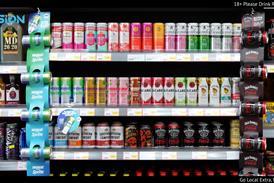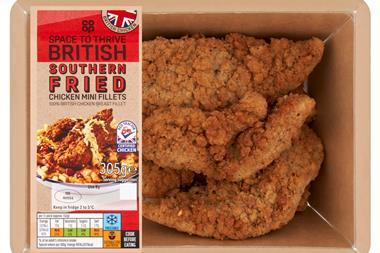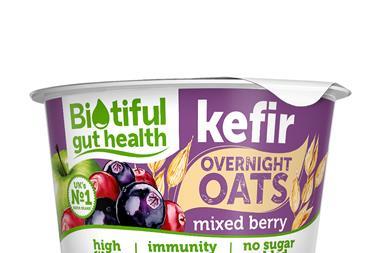It’s no secret that prepared foods have been knocked by the credit crunch, with IGD reporting that one in five consumers claim to have bought less over the past six months. Latest figures from TNS Worldpanel show that sales of chilled ready meals in convenience are down 5.7% to £99.3m (52 weeks ending November 30, 2008).
But despite the gloomy outlook there are still pockets of growth, so before you start cancelling orders it might be worth listening to what our experts have to say. “We produce own label products, which is a good place to be because many consumers are trading down and looking for value,” claims a spokesman at ready meals giant Greencore, which produces the Kiveton’s Kitchen range exclusively for the convenience sector.
However, he swiftly adds that retailers shouldn’t concentrate solely on price. “Consumers can be quite sceptical about ready meals, so focusing too heavily on the price might make them question the quality of the food on offer,” he says. “If retailers are discounting meals it can have a knock-on effect on people’s confidence.”
Charles Banks, director of food consultancy The Food People, agrees: “Chilled ready meals have a premium connotation and I wonder whether you’ll create a confusing message if you try to introduce an economy chilled offering.” IGD senior consumer analyst Gerardine Padbury adds that even though money is tight, consumers aren’t as obsessed with price as you might think. “Consumers are interested in the quality of ingredients being used in their chilled meals. There’s probably a greater opportunity for products highlighting these areas than for those that focus simply on price and convenience,” she says. Caribbean Food Company joint owner Mark Davis is adamant that ready meals must maintain their prices in order to survive the economic crisis. “Some meals are too cheap – you can buy bangers & mash for 99p, which is ridiculous,” he says. “Our meals are £3 for a 450g portion, which is reasonable once you take into account the quality of our ingredients.” He says that the recession has made consumers less loyal to specific shops, so c-stores need to ensure they stock meals that make them indispensable. “Consumers are shopping around more and will look to convenience stores for quality specialist local and ethnic products,” he claims.
Ready for adventure
Davis believes that convenience retailers should take more risks when it comes to exotic flavours. “I don’t think c-stores are bold enough,” he says. “The Co-op and some of the bigger symbol groups are taking advantage, but independents need to make more of exciting flavours.”
He concedes that c-stores need to stock best-sellers, but adds: “Retailers have to show they’re not afraid to try something new. Consumers will carry on wanting those new flavours they taste on holiday.” New Covent Garden group marketing manager Andrew Ovens believes that there is plenty of interest in alternative ingredients within the chilled soups market. “The flavours in fresh soup are more adventurous than with ambient,” he says. “People are aware that we have a big range [28 varieties] and they do take notice of more unusual flavours.” New Covent Garden is meeting demand for lesser-known flavours with dishes such as Toulouse sausage & butternut squash. “Last year we had Thai chicken soup, but now we have Thai Vegetable as well,” says Ovens. “People are travelling further and tasting more exotic foods.” He claims that most consumers want the best of both worlds, though. “People tend to buy two soups at once – usually their favourite and then one that’s a bit different, so our limited-edition Soup of the Month option is proving to be a hit.” As well as showcasing exotic flavours, the company’s Soup of the Month allows it to cash in on seasonal trends. Diet soup The Vegetable Collection is its Soup of the Month for January, which is popular with consumers who are looking to cut calories after Christmas.
The company’s strategy of offering favourites alongside more unusual variants seems to be paying off. “Over the past four years we’ve seen annual growth of 10%, and sales in the last quarter were up 16.6% year on year,” says Ovens. This is well above the market for chilled soups within the convenience sector, which is up 4.8% at £77.7m, according to TNS Worldpanel (52 weeks ending July 13, 2008).
Greencore has also taken consumers’ desire for both classic and novel flavours on board. “The focus for us isn’t so much on creating new variants, but rather taking a different slant on an existing dish,” says a spokesman. “For example, in our WeightWatchers sausage & mash the mash is made from vegetables and comes with a cider gravy.” In spite of the credit crunch putting the breaks on consumer spending, Greencore is confident that its sector will survive. “One of the big drivers of success in prepared foods is that many consumers aren’t confident in the kitchen,” says the firm. “There’s still going to be a market for it despite everything because you can’t gain cooking skills overnight.”
However, he swiftly adds that retailers shouldn’t concentrate solely on price. “Consumers can be quite sceptical about ready meals, so focusing too heavily on the price might make them question the quality of the food on offer,” he says. “If retailers are discounting meals it can have a knock-on effect on people’s confidence.”
Charles Banks, director of food consultancy The Food People, agrees: “Chilled ready meals have a premium connotation and I wonder whether you’ll create a confusing message if you try to introduce an economy chilled offering.” IGD senior consumer analyst Gerardine Padbury adds that even though money is tight, consumers aren’t as obsessed with price as you might think. “Consumers are interested in the quality of ingredients being used in their chilled meals. There’s probably a greater opportunity for products highlighting these areas than for those that focus simply on price and convenience,” she says. Caribbean Food Company joint owner Mark Davis is adamant that ready meals must maintain their prices in order to survive the economic crisis. “Some meals are too cheap – you can buy bangers & mash for 99p, which is ridiculous,” he says. “Our meals are £3 for a 450g portion, which is reasonable once you take into account the quality of our ingredients.” He says that the recession has made consumers less loyal to specific shops, so c-stores need to ensure they stock meals that make them indispensable. “Consumers are shopping around more and will look to convenience stores for quality specialist local and ethnic products,” he claims.
Ready for adventure
Davis believes that convenience retailers should take more risks when it comes to exotic flavours. “I don’t think c-stores are bold enough,” he says. “The Co-op and some of the bigger symbol groups are taking advantage, but independents need to make more of exciting flavours.”
He concedes that c-stores need to stock best-sellers, but adds: “Retailers have to show they’re not afraid to try something new. Consumers will carry on wanting those new flavours they taste on holiday.” New Covent Garden group marketing manager Andrew Ovens believes that there is plenty of interest in alternative ingredients within the chilled soups market. “The flavours in fresh soup are more adventurous than with ambient,” he says. “People are aware that we have a big range [28 varieties] and they do take notice of more unusual flavours.” New Covent Garden is meeting demand for lesser-known flavours with dishes such as Toulouse sausage & butternut squash. “Last year we had Thai chicken soup, but now we have Thai Vegetable as well,” says Ovens. “People are travelling further and tasting more exotic foods.” He claims that most consumers want the best of both worlds, though. “People tend to buy two soups at once – usually their favourite and then one that’s a bit different, so our limited-edition Soup of the Month option is proving to be a hit.” As well as showcasing exotic flavours, the company’s Soup of the Month allows it to cash in on seasonal trends. Diet soup The Vegetable Collection is its Soup of the Month for January, which is popular with consumers who are looking to cut calories after Christmas.
The company’s strategy of offering favourites alongside more unusual variants seems to be paying off. “Over the past four years we’ve seen annual growth of 10%, and sales in the last quarter were up 16.6% year on year,” says Ovens. This is well above the market for chilled soups within the convenience sector, which is up 4.8% at £77.7m, according to TNS Worldpanel (52 weeks ending July 13, 2008).
Greencore has also taken consumers’ desire for both classic and novel flavours on board. “The focus for us isn’t so much on creating new variants, but rather taking a different slant on an existing dish,” says a spokesman. “For example, in our WeightWatchers sausage & mash the mash is made from vegetables and comes with a cider gravy.” In spite of the credit crunch putting the breaks on consumer spending, Greencore is confident that its sector will survive. “One of the big drivers of success in prepared foods is that many consumers aren’t confident in the kitchen,” says the firm. “There’s still going to be a market for it despite everything because you can’t gain cooking skills overnight.”
meet the supplier
Supplier: Emmi Background: With roots dating back to 1907, Emmi is a leading supplier of fresh Swiss dairy products. The company is based in Lucerne, Switzerland, and its product lines include premium yogurt, muesli, and the functional cheese alternative Minicol – clinically proven to actively reduce cholesterol levels. The company’s cheeses include the cave-aged Kaltbach brand, available in Emmental and Le Gruyère varieties.
Product innovation, gains in market share and acquisitions have contributed to several years of sustained growth in Switzerland and in international markets. It posted sales of £687.3m in the first half of 2008. Emmi employs 3,351 people full time in Switzerland, Europe and North America.
Recent Product Launches: The brand’s hero products are Caffe Latte and Choco Latte iced coffee and chocolate drinks. The iced chocolate is available in classic and a new dark chocolate variety.
Distribution: National distribution through multiples and independents via wholesalers and cash and carries.
Supplier: Emmi Background: With roots dating back to 1907, Emmi is a leading supplier of fresh Swiss dairy products. The company is based in Lucerne, Switzerland, and its product lines include premium yogurt, muesli, and the functional cheese alternative Minicol – clinically proven to actively reduce cholesterol levels. The company’s cheeses include the cave-aged Kaltbach brand, available in Emmental and Le Gruyère varieties.
Product innovation, gains in market share and acquisitions have contributed to several years of sustained growth in Switzerland and in international markets. It posted sales of £687.3m in the first half of 2008. Emmi employs 3,351 people full time in Switzerland, Europe and North America.
Recent Product Launches: The brand’s hero products are Caffe Latte and Choco Latte iced coffee and chocolate drinks. The iced chocolate is available in classic and a new dark chocolate variety.
Distribution: National distribution through multiples and independents via wholesalers and cash and carries.


























No comments yet